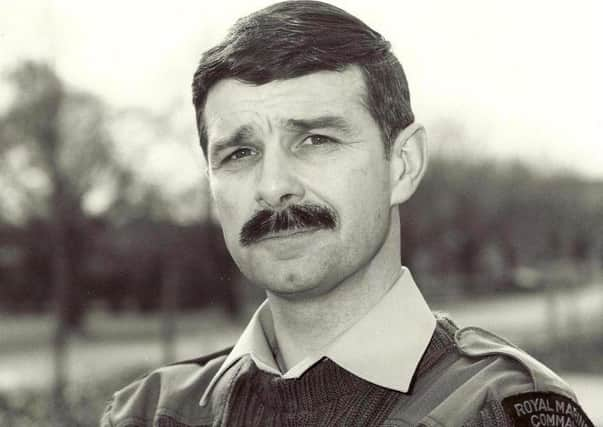Obituary: Des Wassall, Royal Marine who won Military Medal for bravery during Falklands conflict


When Des Wassall joined the Royal Marines he was a teenage boy intent on escaping life in a small English market town. By the time he retired from the colours he had risen to the top of his field and been decorated for displaying exemplary bravery in battle.
From 16-year-old junior marine to senior regimental sergeant major, his career had taken him to Borneo and Norway, Scotland, Northern Ireland and Iraq but his most courageous exploits were played out under the noses of the enemy during Britain’s fight to re-take the Falkland Islands from invading Argentinian forces.
Advertisement
Hide AdAdvertisement
Hide AdAs a mountain leader commanding a four-man team in the Mountain and Arctic Warfare Cadre, his quiet and steadfast leadership coupled with his unfailing professionalism resulted in him being selected for several particularly hazardous missions during the 1982 conflict. These culminated in an operation on the area known as Goat Ridge, while it was still under enemy control.
During the mission, which earned him the Military Medal, he led his team on a detailed night reconnaissance patrol, creeping forward the entire night along the ridge’s narrow spine-back. They then laid up for 24 hours, sometimes just a few feet from enemy troops, observing Argentine movements and enabling Wassall to produce a detailed map pinpointing the size and location of the enemy position – vital knowledge which was subsequently used to very good effect.
Whilst in the area he also directed and controlled artillery fire to within 20 metres of his own men, causing considerable damage to the enemy. And two nights later he returned to Goat Ridge and led the 1st Battalion 7th Gurkha Rifles in their advance to attack the key position of Mount William.
The operation was detailed in No Picnic, an account of 3 Commando Brigade’s Falklands War by the brigade’s commander Major General Julian Thompson, and Wassall was commended in his medal citation for setting an example of “courage in the face of the enemy and the elements that was an inspiration to all.”
Originally Wassall, from Shifnal in Shropshire, had intended to become an architect but he’d had a taste of military life after joining the Territorial Army while at Trench Secondary Modern Boys’ School and, coupled with the lack of opportunities in Shifnal, this spurred him on to leave his hometown and join the Royal Marines instead.
He signed up in 1965 and on completing his training joined 42 Commando where the marines were heavily involved in jungle training. He became part of a small team in Malaya training South Vietnamese rangers and American marines.
Then in 1971 he moved to Arbroath when HMS Condor became home to 45 Commando. There he met his future wife Elizabeth when she visited the base with friends and they were engaged within six months. A year-long separation followed while her fiancé was posted to the Falkland Islands but they married shortly after his return, in a ceremony at Auchenblae in May 1973.
During his Arbroath posting Wassall qualified as a mountain leader, specialising in mountain and Arctic warfare, and earned a reputation for being calm and quietly authoritative – the ultimate professional who operated without the need for a raised voice or lost temper.
Advertisement
Hide AdAdvertisement
Hide AdRespected and trusted by his men, one of his patrol during the Falklands recce on Goat Ridge summed it up: “When he spoke, we listened. We listened because we knew that whatever was spoken by Des would undoubtedly be the best plan for achieving the task set and that any course of action taken would not unnecessarily endanger the patrol In short, he was a leader we trusted and were prepared to follow – anywhere.”
The expertise of Wassall and colleagues in the Mountain and Arctic Warfare Cadre (MAWC) in 1982 paved the way for today’s Royal Marines’ elite Brigade Patrol Troop and other Brigade Reconnaissance Forces, both of which have had notable successes in Afghanistan and Iraq.
As his career progressed he became warrant officer sergeant major of the MAWC and then regimental sergeant major of 45 Commando in Arbroath – a period he recalled as the happiest of his career and which included demanding operational deployments to Northern Ireland and Iraq.
Later promoted to senior regimental sergeant major, he was made an MBE in the 1992 New Year’s Honours in recognition of his distinguished military career and in particular for his work in Iraq the previous year where he was deployed to help Kurdish refugees and provide protection from the Iraqi secret police. He retired in 1994, described as the most senior and respected warrant officer in the Royal Marines. Although he had left the services, he continued to work, becoming accommodation officer at the University of Abertay until finally retiring fully in 2012.
A family man, despite the enforced absences his career as a Marine had entailed – it was not unusual for him to drive home overnight from Plymouth on a Friday, returning overnight on Sunday – he delighted in passing on his knowledge of the great outdoors to his two daughters. An accomplished climber, he won the Eiger Sanction Axe for best mountain leader on a Marines’ course, scaled the Eiger many times on various routes and had been asked to join a K2 climbing expedition when his girls were young. He declined that opportunity as he did not want to take any risks and felt he had nothing prove. However, he and his daughters enjoyed outdoor adventures together. He took them camping, climbing and abseiling, imbuing in them his love of the hills, a passion now being passed on to the next generation, his much-loved grandchildren.
He is survived by his wife Elizabeth, their daughters Heather and Kirsty and grandchildren Freya, Struan and Millie.
ALISON SHAW